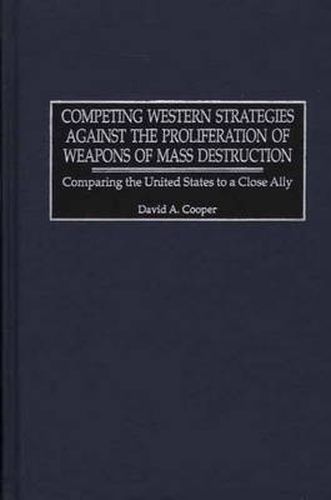Readings Newsletter
Become a Readings Member to make your shopping experience even easier.
Sign in or sign up for free!
You’re not far away from qualifying for FREE standard shipping within Australia
You’ve qualified for FREE standard shipping within Australia
The cart is loading…






Differences between U.S. and its Western allies’ anti-proliferation strategies suggest wider patterns of disagreement, posing serious challenges to international anti-proliferation efforts. Preventing the spread of weapons of mass destruction (WMD) is an urgent national and international security objective. How to realize this goal is a controversial matter, though. Chemical and biological weapons and missile technology are threats to peace equaled only by nuclear weapons. Yet for the grave dangers they pose, and despite the intense alarm expressed over the proliferation of non-nuclear WMD over the past decade, scholarly studies of national endeavors to stop the spread of these weapons is scant. Cooper remedies this by developing conceptual and normative frameworks to better understand national non-proliferation efforts, then examines competing U.S. and Australian strategies, respectively, of capability denial and non-possession norm building. While not wholly incompatible, these competing strategies often impede one another’s progress and illuminate larger fissures in Western non-proliferation policies, fissures that ultimately may splinter international coordination and enervate future attempts to prevent the pernicious multiplication of WMDs. Based on extensive primary research, including hundreds of previously classified documents, and interviews with dozens of present and past officials ranging from desk officers to cabinet ministers, Cooper’s book will appeal to anybody interested in the issues of implementing effective non-proliferation policies. Policy analysts and scholars alike will benefit from the scholarly account written by a U.S. arms control expert.
$9.00 standard shipping within Australia
FREE standard shipping within Australia for orders over $100.00
Express & International shipping calculated at checkout
Stock availability can be subject to change without notice. We recommend calling the shop or contacting our online team to check availability of low stock items. Please see our Shopping Online page for more details.
Differences between U.S. and its Western allies’ anti-proliferation strategies suggest wider patterns of disagreement, posing serious challenges to international anti-proliferation efforts. Preventing the spread of weapons of mass destruction (WMD) is an urgent national and international security objective. How to realize this goal is a controversial matter, though. Chemical and biological weapons and missile technology are threats to peace equaled only by nuclear weapons. Yet for the grave dangers they pose, and despite the intense alarm expressed over the proliferation of non-nuclear WMD over the past decade, scholarly studies of national endeavors to stop the spread of these weapons is scant. Cooper remedies this by developing conceptual and normative frameworks to better understand national non-proliferation efforts, then examines competing U.S. and Australian strategies, respectively, of capability denial and non-possession norm building. While not wholly incompatible, these competing strategies often impede one another’s progress and illuminate larger fissures in Western non-proliferation policies, fissures that ultimately may splinter international coordination and enervate future attempts to prevent the pernicious multiplication of WMDs. Based on extensive primary research, including hundreds of previously classified documents, and interviews with dozens of present and past officials ranging from desk officers to cabinet ministers, Cooper’s book will appeal to anybody interested in the issues of implementing effective non-proliferation policies. Policy analysts and scholars alike will benefit from the scholarly account written by a U.S. arms control expert.